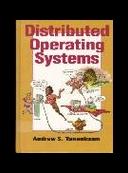Книга: Distributed operating systems
4.5.2. System Failures
4.5.2. System Failures
In a critical distributed system, often we are interested in making the system be able to survive component (in particular, processor) faults, rather than just making these unlikely. System reliability is especially important in a distributed system due to the large number of components present, hence the greater chance of one of them being faulty.
For the rest of this section, we will discuss processor faults or crashes, but this should be understood to mean equally well process faults or crashes (e.g., due to software bugs). Two types of processor faults can be distinguished:
1. Fail-silent faults.
2. Byzantine faults.
With fail-silent faults, a faulty processor just stops and does not respond to subsequent input or produce further output, except perhaps to announce that it is no longer functioning. These are also called fail-stop faults. With Byzantine faults, a faulty processor continues to run, issuing wrong answers to questions, and possibly working together maliciously with other faulty processors to give the impression that they are all working correctly when they are not. Undetected software bugs often exhibit Byzantine faults. Clearly, dealing with Byzantine faults is going to be much more difficult than dealing with fail-silent ones.
The term "Byzantine" refers to the Byzantine Empire, a time (330-1453) and place (the Balkans and modern Turkey) in which endless conspiracies, intrigue, and untruthfulness were alleged to be common in ruling circles. Byzantine faults were first analyzed by Pease et al. (1980) and Lamport et al. (1982). Some researchers also consider combinations of these faults with communication line faults, but since standard protocols can recover from line errors in predictable ways, we will examine only processor faults.
- 2.4.4. RPC Semantics in the Presence of Failures
- 4.5.3. Synchronous versus Asynchronous Systems
- System tools used for debugging
- Integrated Secure Communications System
- Когда включаю компьютер, при загрузке пишется Insert system disk and press enter. Что нужно делать?
- На всех дисках моего компьютера есть папка System Volume Information. Для чего она нужна?
- 14.5.1. Open Systems Interconnection
- 5.3. TRENDS IN DISTRIBUTED FILE SYSTEMS
- Абстрактный базовый класс FileSystemInfo
- 1. Basic microprocessor systems
- CHAPTER 12 System-Monitoring Tools
- Navigating Through the File System




